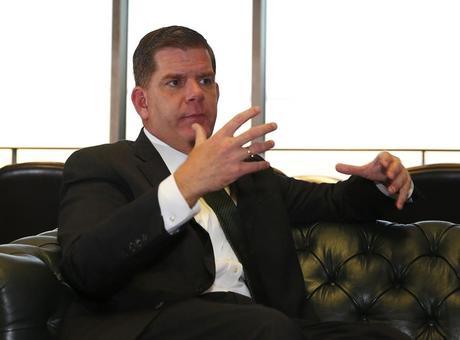Attorney General Maura Healey has reached a $380,000 settlement with a Canton-based building contractor accused of falsely claiming they had hired minority- and women-owned subcontractors as required on a $15 million dollar state project.
The company, ENE Systems, Inc. — a systems engineering firm that has worked on major building projects across the region — denies any wrongdoing, and said it tried to meet the hiring goals, but it agreed to pay $300,000, give up another $81,000 remaining on the contract and conduct an annual review of its own compliance with state requirements for hiring minorities and women. The settlement is the seventh "false claims" case brought by the AG's office over the past decade against companies accused of failing to meet minority hiring commitments, and is the second largest. Six of these cases have been brought by a new false claims division created by Healey in 2015.
Mark D. Smith, a Boston attorney representing ENE, said his client did nothing wrong and fully cooperated with the Attorney General’s investigation.
“ENE did not knowingly violate any laws,” Smith said.
Earlier this year, an investigation by WGBH’s New England Center for Investigative Reporting showed that minority-owned businesses — black owned businesses in particular — receive only a tiny fraction of the billions of dollars state agencies spend each year on contractors, and their share of state contracts and discretionary agency spending has declined over the past 20 years.
Despite the high marks Massachusetts government gives itself year after year in its annual report on diversity hiring, minority business owners competing for state contracts were awarded $135 million less in 2018 than they were in 1998 based on inflation-adjusted dollars, state records show. That’s a drop of 24 percent.
While the state requires prime contractors to hire a percentage of minority and women owned subcontractors on any big job, state agencies have provided little enforcement to ensure these goals are met.
Healey told WGBH News she wants to change that.
“The more cases we do, the more we hope we’ll have an impact on educating the industry about the importance of these requirements, which are there and intended to create more opportunities for minority and women-owned businesses to participate in state contracting,” she said.
But the state’s dispute with ENE highlights just how little money trickles down to minority firms even on a job where their participation is written into the contract.
According to documents obtained by NECIR, the state's Division of Capital Asset Management and Maintenance (DCAMM) — the state's major construction agency — initially signed a $9.4 million contract with ENE Systems to do mechanical work at several state buildings in 2014. The contract included an agreement that ENE would spend $470,000 hiring minority-owned and women-owned subcontractors, which was 5% of the total.
Over the course of several years, the value of the contract ballooned to "more than $15,000,000," but the baseline targets never changed and ENE ended up spending less than $100,000 with minority and women owned businesses — less than 1% of the contract.
In a February 2019 memo, DCAMM documented a long list of failures by ENE to hire minority contractors or to even respond to DCAMM requests for information dating back several years. ENE kept shifting the names of minority and women-owned businesses it said it was doing business with and failed to document payments, the agency said.
But even after a five-year dispute with ENE, the only penalty DCAMM imposed was withholding $81,700 in payments to the company. Meanwhile, in February 2018, DCAMM announced ENE was getting a new contract to upgrade the control systems at its McCormack Building headquarters.
According to the DCAMM memo, at the end of 2018, ENE submitted documents showing payments to three minority- and women-owned businesses, including one called Total Mechanical, but DCAMM found "the work to be performed by Total Mechanical appears to have been subcontracted out in full to a non-MBE/WBE firm."
Darin Yee, the owner of Total Mechanical Service Corp., told WGBH News,"I take the blame for that part." Yee said that after he had accepted a plumbing contract from ENE, his nephew — who was the plumber in his shop — decided to retire, and “I didn’t have any people behind him.” So he hired one of the other contractors that was already on the site to do the plumbing work.
“It was my fault. I was between a rock and a hard place,” Yee said. "I needed to fulfill the job."
By February 2019, DCAMM had confirmed only $6,654 in payments to a minority owned business out of the contract valued over $15,000,000. Healey’s office said they were able to document about $28,000 in total payments to minority firms.
The settlement with the Attorney General's office requires the company to pay $300,000 on top of the $81,700 DCAMM withheld and mandates that each time ENE makes a bid for government contracts in the future, the company must have a bid manager overseeing the process to make sure ENE can meet its minority and women hiring commitments. The company has also agreed to annually audit its own compliance with minority and women hiring requirements.
Priscilla Flint-Banks, co-founder of the Dorchester-based Black Economic Justice Institute, said she applauds the attorney general for pursuing the case, but says any money from the settlement should go to the minority contractors that never got paid.
“This is the stuff we’re fighting,” she said. “We are not getting the contracts that we are supposed to and we are not getting the jobs that we are supposed to and there seems to be no accountability.”
Flint-Banks also said the fine is not large enough to change a contractor’s behavior. “$300,000 — that’s just like a drop in the bucket. I mean ... it’s pennies. Out of $15 million? That’s nothing.” And since the fine is going into the state’s general fund instead of to minority businesses, she said, “How is it helping? It’s not helping the contractors.”
But Albert Shen, the former deputy chief of the federal Minority Business Development Agency under President Obama, praised Healey’s action, saying that several states have actually overturned their statutes requiring affirmative action in public contracting.
“It is very encouraging that a state A.G., such as the Massachusetts one, is taking these type of punitive financial measures against companies that are, in essence, falsifying and defrauding equality and diversity and inclusion practices for minority businesses,” Shen said Thursday.
Shen also said state leaders need to consider new laws that would make such fraud cases criminal acts and send a message that public spending needs to target longstanding inequities in minority communities.
Paul Singer is the Investigations Editor and Chris Burrell is an Investigative Reporter at WGBH's New England Center for Investigative Reporting.







 Mayor calls on construction firms to hire more minorities, women, residents
Mayor calls on construction firms to hire more minorities, women, residents
